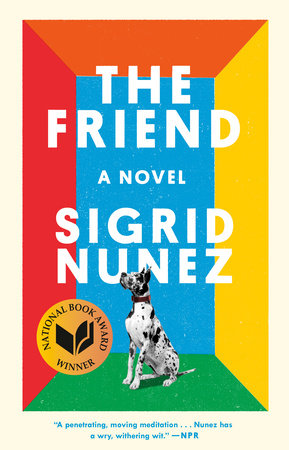Karen’s Pick
February 2019
The Friend
Sigrid Nunez
Reader Beware! If you choose to read this book, don’t be misled by
-
1. the happy and colorful book jacket
2. the sweet looking dog on the cover of the book
3. the books mere 211 pages being a guise for a quick read
Sigrid Nunez’s The Friend is the recipient of the 2018 National Book Award for Fiction. In the first few pages the author does a remarkable job of drawing the reader into the story by her use of artfully crafted prose. It is soon realized that the journey the writer will take us on is going to be unfamiliar. The human characters in the book are all unnamed; the book is presented with typical chapters but the pages present as a diary, or a notebook; there are multiple “plots” or storylines, and the narrative point of view repeatedly shifts. This reader has read and enjoyed previous National Book Award winners, Whitehead’s Underground Railroad in 2016 and Ward’s Sing Unburied Sing in 2017, and realizes the shared standards; books that have won this award are creatively written, highly inventive, morally inspired, and culturally relevant.
The Friend is a literary novel, (often) written in first-person present. The story is about loss and losing, grief and grieving, and love and loving. The author’s use of these charged emotions disarms and often forces the reader to relive personal experiences.
Nunez gives us limited information about her unnamed characters in The Friend. The “Narrator” in the book is a middle aged, female, college English professor, who is the best friend of “You”. You is a late middle aged, male, womanizer, writer, literary mentor, and one-time lover of the narrator, who commits suicide. The only character Nunez names is Apollo, a 180-pound male Harlequin Great Dane, a rescued dog who is traumatized after You’s tragic death.
The reader becomes acquainted with The Friend’s characters through Nunez’s talented writing and skillfully description of the impact of suicide has on them. The Friend’s Narrator is confounded by the suicide of You and struggles to reconcile his being gone. Her use of denial, subversion, and anger prove to be unsuccessful and we see her unraveling. Apollo, You’s awkward-looking Great Dane, is anthropomorphically presented as an abandoned and bereft being and in need of a home. Nunez trusts in the ability of the reader to relate to Apollo’s loss and offers the reader relief when the Narrator agrees to bring the dog home to her 500sq foot NYC apartment. It is at this point that the book becomes the essence of The Friend. The relationship between the narrator and Apollo transforms from that of an owner of a displaced animal to a magical partnership since she believes that they equally suffer from the loss of You. Nunez substantiates this belief through many literary references in the book. From the poet Rilke the Narrator gains understanding of her relationship with Apollo,
Perhaps all the dragons in our lives are princesses who are only waiting for us to act, just once, with beauty and courage. Perhaps everything that frightens us is, in its deepest essence, something helpless that wants our love.
In The Friend, death by suicide not only relates to the loss of “You”. Nunez uses the subject of suicide to symbolize the continuing erosion and slow death of the literary profession. The Narrators reference to the lack of honesty, relevant questioning and integrity of her literary colleagues and writing students leads the reader to believe that these statements are based on the authors’ own experiences. Using more of literary quotations in The Friend, Nunez supports the Narrators thoughts about her profession,
All writers are monsters. Henry de Montherkant
Writers are always selling someone out. [Writing] is an aggressive, even a hostile act….the tactic of a secret bully. Joan Didion
Any writer worth his salt knows that only a small proportion of literature does more than partly compensate people for the damage they have suffered in learning to read. – Rebecca West
There were times that reading The Friend book was a bit of a challenge. It was common for this reader to “ask Google” for information to fully understand the authors intent, especially when the Narrator asks, “Why dogs could not have a Proustian moment”. In discussing my reaction to the authors need to include this question in the book with my friend; ironically she responded by sending me a quote from a Proust essay “…Complexity should never be a barrier to intellectual curiosity”. It would be wise for the would- be reader to remember this quote when deciding to read The Friend and approach the book with the level of inquisitiveness Nunez requires.
